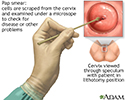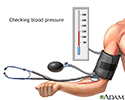Health screenings for women age 65 and older
Health maintenance visit - women - over age 65; Physical exam - women - over age 65; Yearly exam - women - over age 65; Checkup - women - over age 65; Women's health - over age 65; Preventive care exam - women - over age 65
You should visit your health care provider from time to time, even if you are healthy. The purpose of these visits is to:
- Screen for medical issues
- Assess your risk for future medical problems
- Encourage a healthy lifestyle
- Update vaccinations and other preventive care services
- Help you get to know your provider in case of an illness
Information
Even if you feel fine, you should still see your provider for regular checkups. These visits can help you avoid problems in the future. For example, the only way to find out if you have high blood pressure is to have it checked regularly. High blood sugar and high cholesterol levels also may not have any symptoms in the early stages. A simple blood test can check for these conditions.
High blood pressure
Blood pressure is a measurement of the force exerted against the walls of your arteries as your heart pumps blood to your body. Hypertension is the ...

High cholesterol
Cholesterol is a fat (also called a lipid) that your body needs to work properly. Too much bad cholesterol in your blood can increase your chance of...

There are specific times when you should see your provider or receive specific health screenings. The US Preventive Services Task Force publishes a list of recommended screenings. Below are screening guidelines for women age 65 and older.
BLOOD PRESSURE SCREENING
Have your blood pressure checked at least once every year. Watch for blood pressure screenings in your area. Ask your provider if you can stop in to have your blood pressure checked. You can also check your blood pressure using the automated machines at local grocery stores and pharmacies.
Blood pressure
Blood pressure is a measurement of the force on the walls of your arteries as your heart pumps blood through your body. You can measure your blood pr...

Ask your provider if you need your blood pressure checked more often if:
- You have diabetes, heart disease, kidney problems, or are overweight or have certain other health conditions.
Heart disease
Coronary heart disease is a narrowing of the blood vessels that supply blood and oxygen to the heart. Coronary heart disease (CHD) is also called co...
 ImageRead Article Now Book Mark Article
ImageRead Article Now Book Mark ArticleKidney problems
Chronic kidney disease is the slow loss of kidney function over time. The main job of the kidneys is to remove wastes and excess water from the body...
 ImageRead Article Now Book Mark Article
ImageRead Article Now Book Mark Article - You have a first-degree relative with high blood pressure.
- You are Black.
- Your blood pressure top number is from 120 to 129 mm Hg, or the bottom number is from 70 to 79 mm Hg.
If the top number is 130 mm Hg or greater, but lower than 140 mm Hg or the bottom number is 80 mm Hg or greater but lower than 90 mm Hg, this is considered to be stage 1 hypertension. Readings above these are considered to be stage 2 hypertension. Schedule an appointment with your provider to learn how you can reduce your blood pressure. Record your blood pressure numbers and bring this information to share with your provider.
BREAST CANCER SCREENING
Experts do not agree about the benefits of breast self-exams in finding breast cancer or saving lives. Talk to your provider about what is best for you.
Breast cancer
Breast cancer is cancer that starts in the tissues of the breast. There are two main types of breast cancer:Ductal carcinoma starts in the tubes (du...

Mammography is performed to screen women to detect early breast cancer when it is more likely to be cured. The recommendations of different expert organizations can differ.
- Women up to age 75 should have a mammogram every 1 to 2 years, depending on their risk factors, to check for breast cancer.
Mammogram
A mammogram is an x-ray picture of the breasts. It is used to evaluate some breast symptoms and to find breast cancer in women with no symptoms (cal...
 ImageRead Article Now Book Mark Article
ImageRead Article Now Book Mark Article - Women with a family history of breast cancer should work with their health care provider to assess their risk of breast cancer. In some situations, additional testing may be considered.
Mammograms work best at finding breast cancer in women ages 40 to 74. It is not clear how well mammograms work at finding cancer in women age 75 and older. Talk to your provider about what is best for you.
CERVICAL CANCER SCREENING
After age 65, most women who have not been diagnosed with cervical cancer or precancer can stop having screening tests, as long as:
- They have had 3 consecutive negative Pap test results or 2 consecutive negative HPV tests results within 10 years.
- The most recent test occurred within 5 years.
CHOLESTEROL SCREENING
If your cholesterol level is normal, have it rechecked at least every 5 years.
You should have repeat testing sooner if:
- Changes occur in your lifestyle (including weight gain and diet)
- You have high cholesterol, diabetes, high blood pressure, heart disease, stroke, or blood flow problems in the legs or feet, or certain other health conditions
COLORECTAL CANCER SCREENING
Until age 75, you should have screening for colorectal cancer on a regular basis. Several tests are available for colorectal cancer screening:
Screening for colorectal cancer
Colon cancer screening can detect polyps and early cancers in the large intestine. This type of screening can find problems that can be treated befo...

- A stool-based fecal occult blood (FOBT) or fecal immunochemical test (FIT) every year
FIT
The fecal immunochemical test (FIT) is used as a screening test for colon cancer. It tests for hidden blood in the stool, which can be an early sign...
 ImageRead Article Now Book Mark Article
ImageRead Article Now Book Mark Article - A stool sDNA-FIT test every 1 to 3 years (colonoscopy is needed if results are positive)
- Flexible sigmoidoscopy every 5 years or every 10 years with stool testing with FOBT or FIT done every year
Flexible sigmoidoscopy
Sigmoidoscopy using a flexible scope is a procedure used to see inside the sigmoid colon and rectum. The sigmoid colon is the area of the large inte...
 ImageRead Article Now Book Mark Article
ImageRead Article Now Book Mark Article - CT colonography (virtual colonoscopy) every 5 years
Virtual colonoscopy
A virtual colonoscopy (VC) is an imaging or x-ray test that looks for cancer, polyps, or other disease in the large intestine (colon). The medical n...
 ImageRead Article Now Book Mark Article
ImageRead Article Now Book Mark Article - Colonoscopy every 10 years
Colonoscopy
A colonoscopy is an exam that views the inside of the colon (large intestine) and rectum, using a tool called a colonoscope. The colonoscope has a sm...
 ImageRead Article Now Book Mark Article
ImageRead Article Now Book Mark Article
You may need a colonoscopy more often if you have risk factors for colon cancer, including:
- Ulcerative colitis
Ulcerative colitis
Ulcerative colitis is a condition in which the lining of the large intestine (colon) and rectum become inflamed. It is a form of inflammatory bowel ...
 ImageRead Article Now Book Mark Article
ImageRead Article Now Book Mark Article - A personal or family history of colorectal cancer
Colorectal cancer
Colorectal cancer is cancer that starts in the large intestine (colon) or the rectum (end of the colon). It is also sometimes simply called colon ca...
 ImageRead Article Now Book Mark Article
ImageRead Article Now Book Mark Article - A history of growths in your colon called adenomatous polyps
Adenomatous polyps
A colorectal polyp is a growth on the lining of the colon or rectum.
 ImageRead Article Now Book Mark Article
ImageRead Article Now Book Mark Article - A family history of inherited colorectal cancer syndromes such as familial adenomatous polyposis (FAP) or hereditary nonpolyposis colorectal cancer (HNPCC).
- People ages 76 through 85 should talk with their health care provider about whether to continue to get screened. People ages 86 and older no longer need colorectal cancer screening.
DENTAL EXAM
- Go to the dentist once or twice every year for an exam and cleaning. Your dentist will evaluate if you have a need for more frequent visits.
PREDIABETES AND TYPE 2 DIABETES SCREENING
You should be screened for prediabetes and type 2 diabetes every 3 years up to age 70 if you are overweight or have obesity.
Prediabetes
Prediabetes occurs when the level of sugar (glucose) in your blood is too high, but not high enough to be called diabetes. If you have prediabetes, ...

Type 2 diabetes
Type 2 diabetes is a lifelong (chronic) disease in which there is a high level of sugar (glucose) in the blood. Type 2 diabetes is the most common f...

EYE EXAM
- Have an eye exam every year. Your provider may recommend more frequent eye exams if you have vision problems or glaucoma risk.
- Have an eye exam that includes an examination of your retina (back of your eye) at least every year if you have diabetes.
HEARING TEST
- Have your hearing tested if you have symptoms of hearing loss.
Hearing loss
Hearing loss is being partly or totally unable to hear sound in one or both ears.
 ImageRead Article Now Book Mark Article
ImageRead Article Now Book Mark Article
IMMUNIZATIONS
Commonly needed vaccines include:
- Flu shot: get one every year
Flu
The flu (influenza) is a viral respiratory illness that causes fever, chills, runny nose, body aches, and cough. It spreads easily from person to pe...
 ImageRead Article Now Book Mark Article
ImageRead Article Now Book Mark Article - COVID-19 vaccine: ask your doctor what is best for you
- Pneumococcal vaccines: you should receive this vaccine
Pneumococcal vaccines
All content below is taken in its entirety from the CDC Pneumococcal Polysaccharide Vaccine Information Statement (VIS): CDC review information for P...
 ImageRead Article Now Book Mark Article
ImageRead Article Now Book Mark Article - Shingles (herpes zoster) vaccine: 2 doses at or after age 50
- Tetanus-diphtheria and acellular pertussis (Tdap) vaccine: have as one of your tetanus-diphtheria vaccines if you did not receive it as an adolescent
- Tetanus-diphtheria: have a booster (Td or Tdap) every 10 years
INFECTIOUS DISEASE SCREENING
Screening for hepatitis C:
- All adults ages 18 to 79 should get a one-time test for hepatitis C.
Hepatitis C
Hepatitis C is a viral disease that leads to swelling (inflammation) of the liver. Other types of viral hepatitis include:Hepatitis AHepatitis BHepat...
 ImageRead Article Now Book Mark Article
ImageRead Article Now Book Mark Article
Screening for human immunodeficiency virus (HIV):
- All people ages 15 to 65 should get a one-time test for HIV
HIV
Human immunodeficiency virus (HIV) is the virus that causes acquired immunodeficiency syndrome (AIDS). When a person becomes infected with HIV, the ...
 ImageRead Article Now Book Mark Article
ImageRead Article Now Book Mark Article
Depending on your lifestyle and medical history, you may need to be screened for infections such as syphilis, chlamydia, and other infections.
LUNG CANCER SCREENING
You should have an annual screening for lung cancer with low-dose computed tomography (LDCT) if:
Lung cancer
Lung cancer is cancer that starts in the lungs. The lungs are located in the chest. When you breathe, air goes through your nose, down your windpipe...

- You are age 50 to 80 years AND
- You have a 20 pack-year smoking history AND
- You currently smoke or have quit within the past 15 years
OSTEOPOROSIS SCREENING
- All women age 65 or older should have a bone density test (DEXA scan).
Bone density test
A bone mineral density (BMD) test measures how much calcium and other types of minerals are in an area of your bone. This test helps your health care...
 ImageRead Article Now Book Mark Article
ImageRead Article Now Book Mark Article - Ask your provider which exercises or other interventions can help prevent osteoporosis or bone fractures.
Osteoporosis
Osteoporosis is a disease in which bones become fragile and more likely to break (fracture).
 ImageRead Article Now Book Mark Article
ImageRead Article Now Book Mark Article
PHYSICAL EXAMS
All adults should visit their provider from time to time, even if they are healthy. The purpose of these visits is to:
- Screen for diseases
- Assess risk of future medical problems
- Encourage a healthy lifestyle
- Update vaccinations and other preventive care services
- Maintain a relationship with a provider in case of an illness
In addition:
- Your blood pressure should be checked at least every year.
- Your height, weight, and body mass index (BMI) should be checked at every exam.
During the exam, your provider will ask questions about:
- Depression and anxiety
Depression
Depression may be described as feeling sad, blue, unhappy, miserable, or down in the dumps. Most of us feel this way at one time or another for shor...
 ImageRead Article Now Book Mark Article
ImageRead Article Now Book Mark Article - Diet and exercise, including exercises to improve your balance and reduce your risk of falling
- Alcohol and tobacco use
- Safety, such as use of seat belts and smoke detectors and intimate partner violence
- Whether you have had any falls or are afraid of falling
- Whether you have symptoms of urinary incontinence
- Your medicines and risk for interactions
SKIN EXAM
Your provider may check your skin for signs of skin cancer, especially if you're at high risk. You may be at risk if you:
Skin cancer
Squamous cell skin cancer is the second most common type of cancer in the United States. Other common types of skin cancer are:Basal cell cancerMelan...

- Have had skin cancer before
- Have close relatives with skin cancer
- Have a weakened immune system
Professional organizations do not recommend for or against performing a skin self-exam.
References
American Academy of Ophthalmology website. Clinical statement: comprehensive adult medical eye examination PPP 2020. www.aao.org/education/preferred-practice-pattern/comprehensive-adult-medical-eye-evaluation-ppp. Updated November 2020. Accessed May 21, 2024.
American Cancer Society website. Breast cancer early detection and diagnosis: American Cancer Society recommendations for the early detection of breast cancer. www.cancer.org/cancer/breast-cancer/screening-tests-and-early-detection/american-cancer-society-recommendations-for-the-early-detection-of-breast-cancer.html. Updated December 19, 2023. Accessed May 21, 2024.
American College of Obstetricians and Gynecologists (ACOG) website. FAQ178: Mammography and other screening tests for breast problems. www.acog.org/patient-resources/faqs/gynecologic-problems/mammography-and-other-screening-tests-for-breast-problems. Updated July 2022. Accessed May 21, 2024.
American College of Obstetricians and Gynecologists. FAQ163: Cervical cancer. www.acog.org/patient-resources/faqs/gynecologic-problems/cervical-cancer. Updated October 2023. Accessed May 21, 2024.
American Dental Association website. Your top 9 questions about going to the dentist -- answered! www.mouthhealthy.org/en/dental-care-concerns/questions-about-going-to-the-dentist. Accessed May 21, 2024.
American Diabetes Association Professional Practice Committee. 2. Diagnosis and Classification of Diabetes: Standards of Care in Diabetes-2024. Diabetes Care. 2024;47(Suppl 1):S20-S42. PMID: 38078589; PMCID: PMC10725812. pubmed.ncbi.nlm.nih.gov/38078589/.
Barton MB, Wolff TA. The preventive health visit. In: Goldman L, Schafer AI, eds. Goldman-Cecil Medicine. 27th ed. Philadelphia, PA: Elsevier; 2024:chap 12.
Brown HL, Warner JJ, Gianos E, et al; American Heart Association and the American College of Obstetricians and Gynecologists. Promoting risk identification and reduction of cardiovascular disease in women through collaboration with obstetricians and gynecologists: a presidential advisory from the American Heart Association and the American College of Obstetricians and Gynecologists. Circulation. 2018;137(24):e843-e852. PMID: 29748185 pubmed.ncbi.nlm.nih.gov/29748185/.
Centers for Disease Control and Prevention website. Recommended Vaccinations for Adults. Recommended Immunizations for adults aged 19 years and older, United States, 2024. www.cdc.gov/vaccines/imz-schedules/adult-easyread.html. Updated August 14, 2024. Accessed September 26, 2024.
Grundy SM, Stone NJ, Bailey AL, et al. 2018 AHA/ACC/AACVPR/AAPA/ABC/ACPM/ADA/AGS/APhA/ASPC/NLA/PCNA Guideline on the management of blood cholesterol: a report of the American College of Cardiology/American Heart Association Task Force on Clinical Practice Guidelines [published correction appears in J Am Coll Cardiol. 2019;73(24):3237-3241]. J Am Coll Cardiol. 2019;73(24):e285-e350. PMID: 30423393 pubmed.ncbi.nlm.nih.gov/30423393/.
Meschia JF, Bushnell C, Boden-Albala B; American Heart Association Stroke Council; et al. Guidelines for the primary prevention of stroke: a statement for healthcare professionals from the American Heart Association/American Stroke Association. Stroke. 2014;45(12):3754-3832. PMID: 25355838 pubmed.ncbi.nlm.nih.gov/25355838/.
Mora S, Libby P, Ridker PM. Primary prevention of cardiovascular disease. In: Libby P, Bonow RO, Mann DL, Tomaselli GF, Bhatt DL, Solomon SD, eds. Braunwald's Heart Disease: A Textbook of Cardiovascular Medicine. 12th ed. Philadelphia, PA: Elsevier; 2022:chap 25.
National Cancer Institute website. Breast cancer screening (PDQ) - health professional version. www.cancer.gov/types/breast/hp/breast-screening-pdq. Updated March 28, 2024. Accessed May 21, 2024.
Studenski S, Van Swearingen J. Falls. In: Fillit HM, Rockwood K, Young J, eds. Brocklehurst's Textbook of Geriatric Medicine and Gerontology. 8th ed. Philadelphia, PA: Elsevier; 2017:chap 103.
US Preventive Services Task Force website. Falls prevention in community-dwelling older adults: interventions. www.uspreventiveservicestaskforce.org/uspstf/recommendation/falls-prevention-community-dwelling-older-adults-interventions. Published June 4, 2024. Accessed July 3, 2024.
US Preventive Services Task Force website. Final recommendation statement. Breast cancer: medication use to reduce risk. www.uspreventiveservicestaskforce.org/uspstf/recommendation/breast-cancer-medications-for-risk-reduction. Updated September 3, 2019. Accessed May 21, 2024.
US Preventive Services Task Force website. Final recommendation statement. Cervical cancer: screening. www.uspreventiveservicestaskforce.org/uspstf/recommendation/cervical-cancer-screening. Updated August 21, 2018. Accessed May 21, 2024.
US Preventive Services Task Force website. Final recommendation statement. Colorectal cancer: screening. www.uspreventiveservicestaskforce.org/uspstf/recommendation/colorectal-cancer-screening. Updated May 18, 2021. Accessed May 21, 2024.
US Preventive Services Task Force website. Final recommendation statement. Hepatitis C virus infection in adolescents and adults: screening. www.uspreventiveservicestaskforce.org/uspstf/recommendation/hepatitis-c-screening. Published March 2, 2020. Accessed May 21, 2024.
US Preventive Services Task Force website. Final recommendation statement. Human immunodeficiency virus (HIV) infection: screening. www.uspreventiveservicestaskforce.org/uspstf/recommendation/human-immunodeficiency-virus-hiv-infection-screening. Published June 11, 2019. Accessed May 21, 2024.
US Preventive Services Task Force website. Hypertension in adults: screening. www.uspreventiveservicestaskforce.org/uspstf/recommendation/hypertension-in-adults-screening. Published April 27, 2021. Accessed May 21, 2024.
US Preventive Services Task Force website. Final recommendation statement: Lung cancer: screening. www.uspreventiveservicestaskforce.org/uspstf/recommendation/lung-cancer-screening. Updated March 9, 2021. Accessed May 21, 2024.
US Preventive Services Task Force website. Final recommendation statement. Osteoporosis to prevent fractures: screening. www.uspreventiveservicestaskforce.org/uspstf/recommendation/osteoporosis-screening. Updated June 26, 2018. May 21, 2024.
US Preventive Services Task Force website. Final recommendation statement. Prediabetes and type 2 diabetes: screening. www.uspreventiveservicestaskforce.org/uspstf/recommendation/screening-for-prediabetes-and-type-2-diabetes. Updated August 24, 2021. Accessed May 21, 2024.
US Preventive Services Task Force website. Final recommendation statement. Skin cancer: screening. www.uspreventiveservicestaskforce.org/uspstf/recommendation/skin-cancer-screening. Updated April 18, 2023. Accessed May 21, 2024.
US Preventive Services Task Force; Nicholson WK, Silverstein M, Wong JB, Barry MJ, Chelmow D, Coker TR, Davis EM, Jaén CR, Krousel-Wood M, Lee S, Li L, Mangione CM, Rao G, Ruiz JM, Stevermer JJ, Tsevat J, Underwood SM, Wiehe S. Screening for Breast Cancer: US Preventive Services Task Force Recommendation Statement. JAMA. 2024 Apr 30. Epub ahead of print. PMID: 38687503. pubmed.ncbi.nlm.nih.gov/38687503/.
Whelton PK, Carey RM, Mancia G, Kreutz R, Bundy JD, Williams B. Harmonization of the American College of Cardiology/American Heart Association and European Society of Cardiology/European Society of Hypertension Blood Pressure/Hypertension Guidelines: comparisons, reflections, and recommendations. Circulation. 2022;146:868-877. DOI: 10.1161/CIRCULATIONAHA.121.054602. PMID 35950927. pubmed.ncbi.nlm.nih.gov/35950927/.
A mammogram is an x-ray picture of the breasts. It is used to find tumors and to help tell the difference between noncancerous (benign) and cancerous (malignant) disease. One breast at a time is rested on a flat surface that contains the x-ray plate. A device called a compressor is pressed firmly against the breast to help flatten out the breast tissue. Each breast is compressed horizontally,then obliquely and an x-ray is taken of each position.
Mammogram
illustration
A Pap test is a simple, relatively inexpensive procedure that can easily detect cancerous or precancerous conditions.
Pap smear
illustration
A fecal occult blood test is a noninvasive test that detects the presence of hidden blood in the stool. Blood in the stool that is not visible is often the first, and in many cases the only, warning sign that a person has colorectal disease, including colon cancer.
Fecal occult blood test
illustration
Blood vessels become less elastic with age. The average blood pressure increases from 120/70 to 150/90 and may persist slightly high even if treated. The blood vessels respond more slowly to a change in body position.
Effects of age on blood pressure
illustration
Osteoporosis is a condition characterized by progressive loss of bone density, thinning of bone tissue and increased vulnerability to fractures. Osteoporosis may result from disease, dietary or hormonal deficiency or advanced age. Regular exercise and vitamin and mineral supplements can reduce and even reverse loss of bone density.
Osteoporosis
illustration
Squamous cell cancer involves cancerous changes to the cells of the middle portion of the epidermal skin layer. It is a malignant tumor, and is more aggressive than basal cell cancer, but still may be relatively slow-growing. It is more likely than basal cell cancer to spread (metastasize) to other locations, including internal organs. Treatment usually involves surgical removal of the tumor along with some surrounding tissue.
Squamous cell cancer
illustration
A mammogram is an x-ray picture of the breasts. It is used to find tumors and to help tell the difference between noncancerous (benign) and cancerous (malignant) disease. One breast at a time is rested on a flat surface that contains the x-ray plate. A device called a compressor is pressed firmly against the breast to help flatten out the breast tissue. Each breast is compressed horizontally,then obliquely and an x-ray is taken of each position.
Mammogram
illustration
A Pap test is a simple, relatively inexpensive procedure that can easily detect cancerous or precancerous conditions.
Pap smear
illustration
A fecal occult blood test is a noninvasive test that detects the presence of hidden blood in the stool. Blood in the stool that is not visible is often the first, and in many cases the only, warning sign that a person has colorectal disease, including colon cancer.
Fecal occult blood test
illustration
Blood vessels become less elastic with age. The average blood pressure increases from 120/70 to 150/90 and may persist slightly high even if treated. The blood vessels respond more slowly to a change in body position.
Effects of age on blood pressure
illustration
Osteoporosis is a condition characterized by progressive loss of bone density, thinning of bone tissue and increased vulnerability to fractures. Osteoporosis may result from disease, dietary or hormonal deficiency or advanced age. Regular exercise and vitamin and mineral supplements can reduce and even reverse loss of bone density.
Osteoporosis
illustration
Squamous cell cancer involves cancerous changes to the cells of the middle portion of the epidermal skin layer. It is a malignant tumor, and is more aggressive than basal cell cancer, but still may be relatively slow-growing. It is more likely than basal cell cancer to spread (metastasize) to other locations, including internal organs. Treatment usually involves surgical removal of the tumor along with some surrounding tissue.
Squamous cell cancer
illustration
Review Date: 8/1/2023
Reviewed By: David C. Dugdale, III, MD, Professor of Medicine, Division of General Medicine, Department of Medicine, University of Washington School of Medicine. Also reviewed by David Zieve, MD, MHA, Medical Director, Brenda Conaway, Editorial Director, and the A.D.A.M. Editorial team. Internal review and update on 08/01/23. Editorial update: 09/26/2024.







